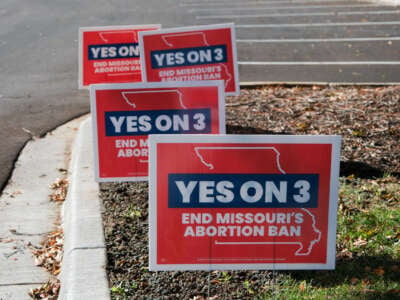This story was originally published by ProPublica. ProPublica is a Pulitzer Prize-winning investigative newsroom. Sign up for The Big Story newsletter to receive stories like this one in your inbox.
One month after Missouri voters approved a constitutional amendment guaranteeing the right to abortion, Republican lawmakers in the deeply red state are already working to overturn it — or at least undermine it.
One measure would ask voters to amend the state constitution to define life as beginning at conception, declaring that embryos are people with rights to life, liberty and the pursuit of happiness.
The result would be to classify abortion as an unlawful killing.
Another proposal, aimed at repealing the abortion rights amendment, would ask voters to ban gender transition procedures for minors, tying the two issues together, despite the fact that the amendment did not address gender surgery and gender-affirming care for transgender children is already illegal in Missouri.
Other proposed amendments include stricter abortion limits, such as restricting access to cases of rape, incest, medical emergencies and fetal anomalies. These measures would impose additional requirements, such as mandating that rape survivors file police reports to obtain an abortion.
Related Story
|
Missouri was one of seven states that passed abortion rights measures on Election Day last week.
GOP lawmakers have also introduced a measure to raise the threshold for amending the state constitution through voter initiatives, which could make it harder to pass similar measures in the future.
The legislative moves follow the Nov. 5 election, in which the amendment to put abortion rights in the state constitution won by a 51.6%-48.4% margin. Starting Thursday, the right to abortion will be constitutionally guaranteed up to the point of fetal viability, while restrictions on post-viability abortions will remain in place.
In other states where voters approved abortion rights measures last month, there were no signs yet that lawmakers would also try to counter those measures.
Even before votes in Missouri had been counted, proponents of Amendment 3, as the measure was called, had anticipated that a victory would be met with efforts to somehow undercut abortion rights.
“These people will continue to rail against abortion,” said state Rep. Deb Lavender, a Democrat from the St. Louis suburbs.
Although Missouri already has a law recognizing life as beginning at conception, stating that unborn children have “protectable interests in life, health, and well-being,” the proposed constitutional amendment would go further. It would effectively elevate this principle to the state constitution and potentially complicate not only abortion rights but the legality of in vitro fertilization and the handling of embryos.
Several states have laws recognizing fetal personhood, but Missouri would be the second — after Alabama — to enshrine it in its constitution. That could create legal and ideological confusion or even conflicts, experts say.
“You could see voters saying, ‘I support a right to abortion,’ but also saying, ‘Life begins at conception,’ without understanding that you can’t have both of those things at the same time,” said Jamille Fields Allsbrook, a professor at St. Louis University School of Law and a former policy analyst for Planned Parenthood Federation of America.
The author of one of the personhood measures, Rep. Justin Sparks, a Republican from the St. Louis suburbs, said he was emboldened by the narrow margin of the abortion rights vote.
“A clear mandate has not been achieved,” he said. While the amendment had strong support in metro St. Louis and Kansas City and in the county that’s home to the University of Missouri, “the vast majority of the rest of the state voted in a different direction,” he added. “So I think it’s fair to again bring the question up.”
But state Sen. Tracy McCreery, a Democrat also from the St. Louis suburbs, noted that Sparks was going against the will of voters in the St. Louis area. “I find that even more disrespectful of the voters,” she said. “It wasn’t just voters that tend to vote Democratic that voted yes on Amendment 3. It was also Republican voters and independent voters, and I think that’s getting lost in this discussion.”
The measure to link abortion and transgender rights reflects the campaign before the election, when abortion opponents conflated these topics. Critics said this strategy seeks to distract from abortion rights, which had strong voter support, by capitalizing on voter discomfort with transgender issues.
While GOP lawmakers push these measures, the legal landscape around abortion in Missouri is already shifting. On Wednesday, a Jackson County Circuit Court heard arguments in a lawsuit brought by Planned Parenthood and the American Civil Liberties Union of Missouri that seeks to strike down Missouri’s near-total abortion ban and other laws that regulate abortion. The lawsuit followed the passage of Amendment 3. Planned Parenthood said if it wins in court it plans to resume abortion services in St. Louis, Kansas City and Columbia on Friday.
Missouri Attorney General Andrew Bailey has acknowledged that the amendment will legalize most abortions when it goes into effect, but he has said he intends to enforce remaining restrictions, such as a ban on abortions after fetal viability, a 72-hour waiting period and parental consent for minors.
Lawmakers are also pushing to raise the bar for passing constitutional amendments. Now, a simple majority is enough; that has allowed Missouri voters to bypass the legislature and pass progressive amendments that lawmakers oppose. A new bill would ask voters to pass a constitutional amendment requiring not just a statewide majority but also a majority of voters in five of the state’s eight congressional districts — a change critics argued would give disproportionate power to rural areas over urban voters. It would then be harder for voters to approve measures that don’t align with the priorities of the conservative politicians they tend to elect.
Earlier this year, a similar effort to make it harder to amend the constitution failed after Democrats in the Senate filibustered it.
Sparks criticized the Republican leadership in the General Assembly for allowing the failure, pointing to a Republican supermajority in both houses that could have passed the measure.
“We hold all the power,” Sparks said. “We hold all the procedural levers of power, and we can shut down debate in both houses any time, any day, for any bill we choose to.”
Florida shows how a higher threshold for voter initiatives might play out. In 2006, the state raised the bar for constitutional amendments to 60%. This year, a majority of voters — 57% — supported an abortion rights amendment, an even bigger margin than in Missouri, but not sufficient in Florida.
It’s not clear yet, though, whether any of the measures have enough support in Missouri’s General Assembly.
Lavender said that the campaign supporting abortion rights significantly outraised its opposition during the election. “It’s going to be difficult to overturn,” she said. “You’ll have the same money that supported it now going up against you.”
Dear Truthout Community,
If you feel rage, despondency, confusion and deep fear today, you are not alone. We’re feeling it too. We are heartsick. Facing down Trump’s fascist agenda, we are desperately worried about the most vulnerable people among us, including our loved ones and everyone in the Truthout community, and our minds are racing a million miles a minute to try to map out all that needs to be done.
We must give ourselves space to grieve and feel our fear, feel our rage, and keep in the forefront of our mind the stark truth that millions of real human lives are on the line. And simultaneously, we’ve got to get to work, take stock of our resources, and prepare to throw ourselves full force into the movement.
Journalism is a linchpin of that movement. Even as we are reeling, we’re summoning up all the energy we can to face down what’s coming, because we know that one of the sharpest weapons against fascism is publishing the truth.
There are many terrifying planks to the Trump agenda, and we plan to devote ourselves to reporting thoroughly on each one and, crucially, covering the movements resisting them. We also recognize that Trump is a dire threat to journalism itself, and that we must take this seriously from the outset.
After the election, the four of us sat down to have some hard but necessary conversations about Truthout under a Trump presidency. How would we defend our publication from an avalanche of far right lawsuits that seek to bankrupt us? How would we keep our reporters safe if they need to cover outbreaks of political violence, or if they are targeted by authorities? How will we urgently produce the practical analysis, tools and movement coverage that you need right now — breaking through our normal routines to meet a terrifying moment in ways that best serve you?
It will be a tough, scary four years to produce social justice-driven journalism. We need to deliver news, strategy, liberatory ideas, tools and movement-sparking solutions with a force that we never have had to before. And at the same time, we desperately need to protect our ability to do so.
We know this is such a painful moment and donations may understandably be the last thing on your mind. But we must ask for your support, which is needed in a new and urgent way.
We promise we will kick into an even higher gear to give you truthful news that cuts against the disinformation and vitriol and hate and violence. We promise to publish analyses that will serve the needs of the movements we all rely on to survive the next four years, and even build for the future. We promise to be responsive, to recognize you as members of our community with a vital stake and voice in this work.
Please dig deep if you can, but a donation of any amount will be a truly meaningful and tangible action in this cataclysmic historical moment. We’re presently working to find 1500 new monthly donors to Truthout before the end of the year.
We’re with you. Let’s do all we can to move forward together.
With love, rage, and solidarity,
Maya, Negin, Saima, and Ziggy
This piece was reprinted by Truthout with permission or license. It may not be reproduced in any form without permission or license from the source.
We need your help to become less dependent on traffic from Facebook and X. Follow us on Bluesky today!




